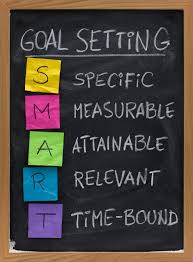You are viewing our site as an Agent, Switch Your View:
Agent | Broker Reset Filters to Default Back to ListS.M.A.R.T. Goal Setting For Real Estate Agents
March 20 2014
 If you do not have goals for your real estate business, you are exponentially less likely to ever be considered a top producing, successful agent.
If you do not have goals for your real estate business, you are exponentially less likely to ever be considered a top producing, successful agent.
Goals are a good thing. They give us direction. They are a constant reminder of the direction we want to head, and where we want to end up. As humans, especially in this day in age, we need direction. Without it, there are too many outside influences that will keep you from reaching your ultimate destination. If you don't reach your ultimate destination, you are not going to be a successful business person.
While goals are good, they are also a tricky thing. Too many times we are not honest with ourselves about where we currently are, so where we want to get is just not realistic. As proud people, we also tend to want to bite off more than we can chew, not taking into account all the outside things that demand our attention and get in the way of us achieving our goals. Because of this, setting S.M.A.R.T. goals when planning the success of your real estate practice is critical.
What are S.M.A.R.T. Goals?
First off, let's just break down what S.M.A.R.T. goals are. Simply put, these goals are:
- Specific - Your goals have to have real number, as well as real deadlines. A goal of, "I want more listings in my farm area" is NOT a S.M.A.R.T. goal.
- Measurable - You have to make sure you can track your goal. Saying, "I want more brand awareness in my farm area," will not work. How does one put a number on brand awareness?
- Attainable - Remember, we are proud by nature and often our eyes are way bigger than our stomachs. Make your goal challenging, but possible. Don't try to take over the real estate industry in a single day. Come up with a logical plan of attack.
- Relevant - Be honest with yourself. As salespeople, we are all in the business of always being "up, positive, and letting the world know about it." But because you know what you and your team are truly capable of, you need to consider any hurdles that are going to come into play while you are setting out after your goal.
- Time-Bound - You HAVE TO have a deadline. Don't keep pushing towards a goal you might hit "some day." If you hope to simply hit a target "some day," that is not a goal and you need to rethink your whole approach.
Okay, Now What?
Now that you know what the S.M.A.R.T. goal methodology is, let's look at an example of what a properly constructed real estate S.M.A.R.T. goal could be. An example of a good S.M.A.R.T. goal for an agent would look something like this:
"I want to win a minimum of 25 listings, specifically in my farm area, over this calendar year."
This goal is specific. It has not only a measurable number, but also a time frame in which that number must happen. It's measurable, simply by the number of listings the agent actually gets (within their farm area, no less). Let's suppose that this agent was averaging 18 listings per year. If that was the case, getting to 25 listings, while a lot of work, is not impossible to imagine and therefore attainable. Again, figuring that this agent has some experience, as long as they have a plan in place to handle the influx of extra business, this would be a realistic goal. Lastly, it is time-bound, given that the goal is set for this calendar year.
S.M.A.R.T. goals are critical to the growth of your real estate practice. Set them and revisit them often.
These goals are universal to all industries. My company relies heavily on S.M.A.R.T. goals. It's very common for my company to have a long term goal that we set S.M.A.R.T. goal rules for, and then many smaller goals, that also use the S.M.A.R.T. goal methodology which will help get us to the overall larger goal. We regularly revisit and evaluate the status of these goals, ensuring that we didn't accidentally oversell our abilities, or set a goal that isn't realistically attainable.
Because of this practice, everyone on my staff knows what the plan is and what is expected. Even better, everyone is on board and enthusiastic to reach the end goal, as they are 100% on board that the goal is realistic and attainable.
To view the original article, visit the Leading Agent blog.









